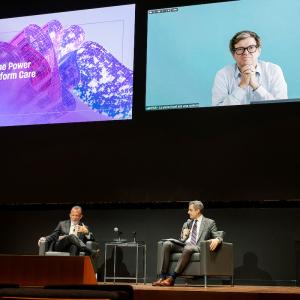Effective mentoring can make all the difference for junior faculty aspiring to an independent career in research. Surprisingly, however, there is little formal guidance to support these young scientists.
In 2014, Georgeann McGuinness, MD, and her colleagues in the Office of Mentoring and Faculty Development set out to change that with an innovative program that provides a “mentoring toolbox” and a framework for training and empowering mentors to help their mentees succeed.
The program is built around the idea that professional development in research should extend far beyond the enhancement of technical skills. “Ultimately we aim to help young researchers overcome barriers to independence,” says Dr. McGuinness, associate dean for mentoring and professional development, professor of radiology, and senior vice chair of the Department of Radiology.
Among the biggest barriers: finding and retaining funding. Here, Dr. McGuinness points to grant-writing workshops and critique and feedback services for grant applications. There’s even a mentoring committee assigned to all junior researchers who receive major federal funding to help them transition from smaller, early career grants to larger grants.
A Tailored Approach to Mentoring
Part of what’s unique about the mentoring program is that it recognizes that every department is different and best served by a tailored approach. “Each department has a mentoring champion who serves as my boots-on-the-ground liaison,” Dr. McGuinness says. Working with these liaisons, her office helps craft department-specific mentoring programs. Each mentoring champion, in turn, ensures that junior faculty have a well-considered mentoring team of senior faculty members who offer advice and guidance on professional growth, and hold mentees accountable for their progress.
To ensure standardization in the quality of mentorship, Dr. McGuinness has created a suite of tools, including encounter forms that provide a template for productive mentor–mentee meetings and a lasting record of the discussion.
A separate template helps mentoring teams write annual letters that summarize agreed-upon goals and progress toward meeting them over the previous year. In some departments, annual surveys provide useful feedback that can help mentoring champions ensure that the mentees’ best interests are being met.
Good mentor–mentee matches can lead to enduring and productive professional relationships. One of the most rewarding aspects of such mentorship, Dr. McGuinness says, is watching mentees succeed and evolve into accomplished scientists and mentors themselves.
“At the end of the day, what is going to be your most impactful and lasting legacy? We all love our fields. We love science. We love medicine,” Dr. McGuinness says, but what endures is the impact of a mentor’s professional generosity in giving their time and energy to help elevate others in field.
“When your mentees do well,” she says, “it’s very gratifying. We all benefit from and share in their success.”

